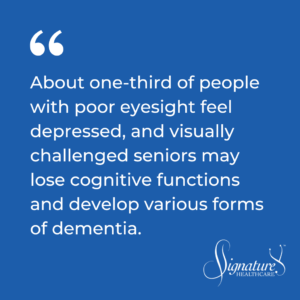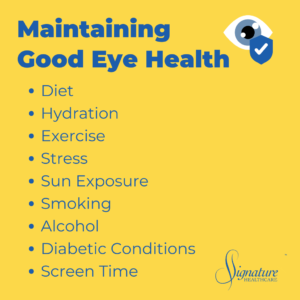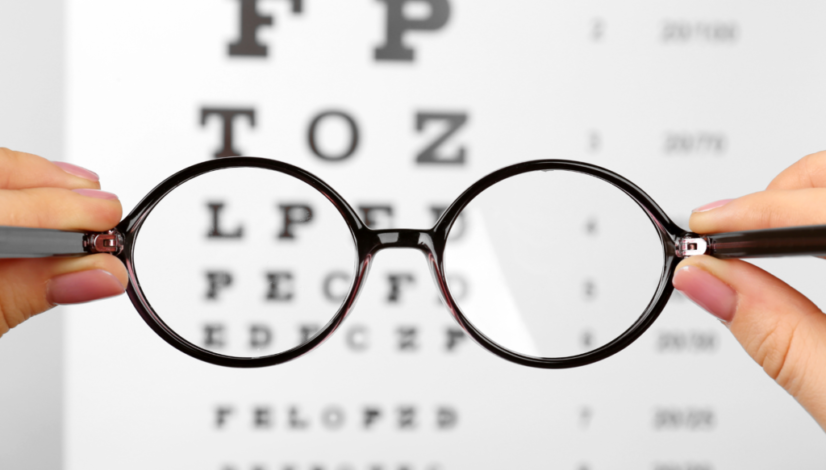How to Keep Your Eyes Healthy at Every Age
Healthy eyes are crucial to our well-being in so many ways. Most importantly, they stimulate the brain to gather and process sensory information about our unique environments. Some experts estimate that our vision delivers 80% of this sensory input to the brain.
Your eyes affect every system in your body, so your eye health significantly impacts your physical condition and well-being — how safely you drive a vehicle, move within your home, enjoy your surroundings, etc.
If or when vision becomes impaired, there’s a greater chance of falls and other accidents. About one-third of people with poor eyesight feel depressed, and visually challenged seniors may lose cognitive functions and develop various forms of dementia.

The Aging Eye
Many people believe that, as we age, signs of worsening vision — like cataracts or macular degeneration — are inevitable. But, while the risk of those conditions increases as we age, they’re not absolute.

We can minimize or slow this natural decline by maintaining good eye health.
Fortunately, most measures we recommend to patients to keep hearts, brains, and digestive systems healthy also benefit the eyes:
Diet
Our bodies need antioxidants, like carotenoids and vitamin C, to keep the lens and other parts of the eye strong and functional. Try:
- A Mediterranean-style diet, which includes a healthy supply of vegetables and fruits rich in antioxidants, especially leafy greens high in lutein, like spinach.
- Fruits and dark-colored berries with vitamin C, like blackberries, blueberries, strawberries, and raspberries.
- Cold-water fish high in omega-3s (particularly docosahexaenoic acid, or DHA), including Alaskan salmon, rainbow trout, sardines, and others.
Hydration
The eye is a complex organ with various fluid-filled layers. Drink adequate amounts of water each day to avoid dry-eye syndrome and keep your eyes sufficiently hydrated.
Exercise
When we move the body, we improve blood flow, providing nutrients and oxygen to all parts of the eye, including the lens. Although the lens itself doesn’t receive direct blood flow, other parts of the eye do.
Stress
Heightened stress levels worsen vision. Medical science hasn’t yet found the exact correlation, but we know unchecked stress increases inflammation throughout the body. Controlling it lessens damage to the retina and cornea.
Sun Exposure
The sun’s rays cause oxidation within the eyes, setting the stage for cataracts and other eye conditions. When outdoors, we must wear sunglasses that protect against UVA and UVB rays. Wear a hat or visor to limit the eyes’ exposure to bright sunlight.
Smoking
We ask patients to avoid smoking if possible. Smoking can cloud the lens or gradually destroy the retina’s center (the macula).
Alcohol
Consuming alcohol regularly impacts the cornea, conjunctiva, retina, and optic nerve. Limiting alcohol intake relieves pressure within the eye and decreases the chance of ill effects.
Diabetic Conditions
High levels of sugar in our bloodstream find their way to our eyes, where they can damage the lens and other parts of the eye. To avoid complications, diabetic patients require more frequent eye checkups than non-diabetics.
Screen Time
The time and intensity we spend looking at screens — computers, cellphones, TVs, etc. — can cause eye fatigue and focus issues. To avoid eye strain, follow the 20/20/20 rule: Every 20 minutes, look away from the screen at something 20 feet away for at least 20 seconds.
Also, every 30 to 90 minutes, get up and away from the computer or any other screen you’re intent on. If we’re focused on a single topic for 90 minutes, we become less efficient and need a break.
Can Supplements Support Vision?
At Signature Healthcare, we’re often asked about the value of supplements such as lutein, zeaxanthin, or beta-carotene to promote eye health:
- We prefer that patients not take beta-carotene, especially if they’re current or former smokers. Beta-carotene is natural but not necessarily safe. High levels of it increase the risk of certain cancers in smokers and ex-smokers.
- AREDS and AREDS2 supplements are designed to prevent or slow macular degeneration. They contain antioxidants like vitamins C and D, as well as lutein and zeaxanthin. But they’re a little concerning: The AREDS multivitamin contains beta-carotene, while AREDS2 contains a significant dose of zinc and copper. I prefer patients look for a multi that contains:
- Lutein and zeaxanthin
- No beta-carotene
- Under 30 mg of zinc
- Under 1 mg of copper
- Fish oil supplements can also present challenges. Replace them by adding cold-water fish to your menu at least twice a week.
Regular Checkups Are Key
To keep your eyes at peak performance, have an ophthalmologist check them at least annually. They’ll inquire about any prescription medications you’re taking, such as certain blood pressure medications, steroids, or antihistamines, that might lead to dry eyes, cataracts, or other issues. Following routine testing, they’ll advise you if you should come back more often, particularly if you’re diabetic.
At Signature Healthcare, we know healthy vision can help you do extraordinary things. With proper care, you can preserve high-quality vision throughout your lifetime.
Let’s chat about how well you’re seeing. Together, we’ll craft a plan to prevent risks and support great eyesight.

Dr. Russ Greenfield
Dr. Greenfield was among the first physicians to train under the direct guidance of Dr. Andrew Weil and has been practicing Integrative Medicine for over 25 years. He is Board Certified in Emergency Medicine and Lifestyle Medicine.

